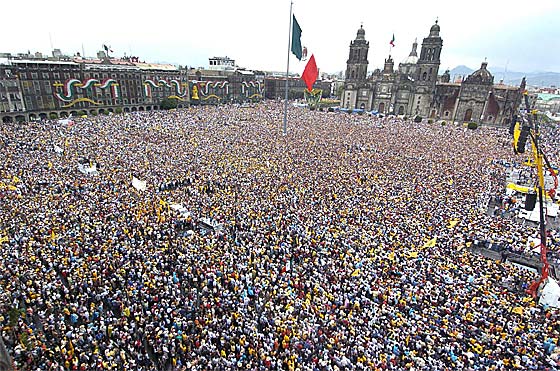Friday, November 03, 2006
Oaxaca Uprising posted by Richard Seymour

Among the many topics I have neglected lately (including the Climate Change March) is the uprising in Oaxaca. Brownfemipower has been covering it extensively, so I suggest you peruse her front page and archives. Through The Scary Door has also been keeping track of the events. The people of this Mexican city, and increasingly right across the state (which bears the same name), have been practising a radical form of democracy through the Popular Assembly of the People of Oaxaca (APPO). The uprising began with a teacher's strike in May of this year - these happen fairly regularly, as it seems to be the only way to get a pay rise out of the neoliberal government - but this year it became a political strike against Ulises Ruiz Ortiz after he sent in 3,000 police to attack the teachers with tear gas and batons back in June, causing over a hundred people to be hospitalised. They have been trying to organise the state under popular assemblies comprising delegates from unions, street blocks, social organisations and cooperatives. For months now, the police have engaged in battles with protesters, while attacking independent media. At the end of last month, several protesters were shot dead by unknown armed men, in what the Mexican government described as a "shootout". The Centro de Medias Libres has footage which it says shows that the one of the killers was Pedro Carmona, a paramilitary and former governor of one of the Oaxaca colonias. Many people thought that it was over on October 30th when the police moved in to 'retake' the city, but the protesters have driven the police out after solidarity blockades were erected across the country. Bloomberg is reporting that the beneficiary of the stolen election is trying to concoct some concessions that might pacify both the strikers and the AMLO campaign. I doubt he will succeed in buying off the protesters, but the revolt can only either spread or subside. The popular assemblies are spreading and need to spread further still, right across Mexico, into every town and workplace. The Zapatistas have pledged their support for the rebellion, but this demands an alteration in their strategy, something flagged by the apparent break with the PRD last year. Their fight to build autonomous zones as counter-powers to the state has raised the possibility of revolution in political discourse, and they did win some concessions against the state-driven process of rolling back land reforms, but of course the state can always bide its time and crush these zones when the struggle subsides. They need to build a national movement prepared to challenge and overthrow state power, so that the popular assemblies can become the new power in Mexico. Of course, no yanqui administration is going to allow that to happen without a fight, as it would give people the wrong idea: hence the interference in Mexico's elections recently. The fight against capitalism is at the same time a fight against imperialism, and it is one that we too have to win.










